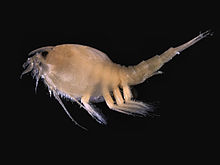Crustaceomorpha
| Crustaceomorpha Temporal range:
| |
|---|---|

| |
| Nebalia bipes, a leptostracan crustacean | |
| Scientific classification | |
| Kingdom: | Animalia
|
| Phylum: | Arthropoda
|
| (unranked): | Crustaceomorpha Chernyshev, 1960
|
| Subphyla | |
| |
Crustaceomorpha is a proposed clade of arthropods that includes crustaceans and numerous extinct groups. Synapomorphies for the clade are that the larval antenna is a feeding or locomotory organ, and there are six endopodal podomeres in post-antennal limbs.[1]
Extinct groups included in Crustaceomorpha vary considerably. It includes Agnostida (usually treated under Trilobita), Waptiida, , Phosphatocopida, and Bradoriida, among others. These primitive crustaceomorphs are grouped under .[2][3]
The validity of Crustaceomorpha is controversial. It has more support among paleontologists who consider it a sister group to Arachnomorpha, which includes trilobites and chelicerates (see cladogram below). Both are grouped under , a clade of arthropods with biramous appendages.[3][4] In contrast, neontologists tend to support the Mandibulata clade, which groups members of Crustacea together with Hexapoda and Myriapoda.[4]
| Common ancestor ← |
| ||||||||||||||||||
See also[]
- Pancrustacea
- Mandibulata
References[]
- ^ Jan Bergström & Xian-Guang Hou (2005). "Early Palaeozoic non-lamellipedian arthropods". In Stefan Koenemann & Ronald A. Jenner (ed.). Crustacea and Arthropod Relationships. Crustacean Issues. Vol. 16. Taylor & Francis. pp. 75–93. doi:10.1201/9781420037548.ch4. ISBN 978-0-8493-3498-6.
- ^ Mikko Haaramo. "Crustaceomorpha – crustaceans and related arthropods". Mikko's Phylogeny Archive. Retrieved January 22, 2012.
- ^ a b S. M. Gon III. "Trilobite Systematic Relationships". A Guide to the Orders of Trilobites. Retrieved January 22, 2012.
- ^ a b David A. Grimaldi & Michael S. Engel (2005). Evolution of the Insects. Cambridge University Press. p. 107. ISBN 978-0-521-82149-0.
- Arthropod taxonomy
- Arthropod stubs